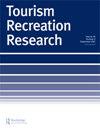Understanding senior citizens’ intentions to use virtual reality for religious tourism in India: a behavioural reasoning theory perspective
IF 3.4
Q1 HOSPITALITY, LEISURE, SPORT & TOURISM
引用次数: 2
Abstract
ABSTRACT The study uses a multi-theoretical approach and the three behavioural theories of Behavioural Reasoning Theory (BRT), Self-Determination Theory (SDT), and Innovation Resistance Theory (IRT) to analyze the motivation of senior citizens to use Virtual Reality (VR) technology for religious tourism. The survey was completed by 300 senior citizens, and PLS-SEM was used to evaluate the results. The study examined the moderating influence of place familiarity on senior citizens intentions to use VR technology. The findings show that the attitude and intention to adopt VR technology are influenced by perceived ease of use, perceived enjoyment, perceived usefulness, and immersion. Also, tradition and image barriers play an influencing role in forming a negative attitude toward adopting VR technology for religious tourism.理解印度老年人在宗教旅游中使用虚拟现实的意图:行为推理理论视角
本文章由计算机程序翻译,如有差异,请以英文原文为准。
求助全文
约1分钟内获得全文
求助全文
来源期刊

Tourism Recreation Research
HOSPITALITY, LEISURE, SPORT & TOURISM-
CiteScore
11.30
自引率
7.10%
发文量
77
期刊介绍:
Tourism Recreation Research is a multidisciplinary international journal now published quarterly; it focuses on research problems in various tourism and recreational environments — ecological, economic, and socio-cultural — and attempts to seek solutions for sustainable development. Contributions are also encouraged on fundamental research concepts and theories. The journal carries regular features such as Research Note, Post-Published Reviews and Book Reviews. The ‘Research Note’ provides opportunity for scholars who have attained sufficient maturity to establish reliable findings in their field of research. The ‘Post-Published Review’ section has been introduced to capture deep insights into the papers that have already been published in Tourism Recreation Research to fill in gaps in the received information. Strong emphasis is laid on original research and readable prose.
 求助内容:
求助内容: 应助结果提醒方式:
应助结果提醒方式:


